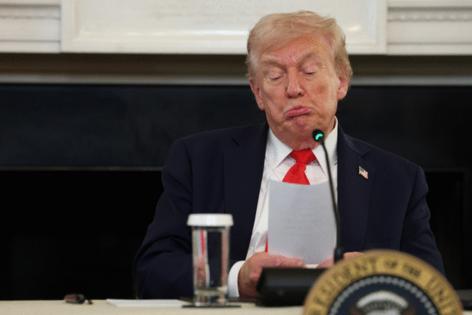Commentary: On free speech, hypocrisy now rules
Published in Op Eds
Free speech for me, not for thee.
That’s the oldest trick in the hypocrite’s playbook. And over the past few weeks, Republicans and Democrats have both taken a page from it.
Witness recent events at Rutgers University following the murder of Charlie Kirk, the conservative activist who founded Turning Point USA. The group’s Rutgers chapter circulated a petition demanding that the university fire history professor Mark Bray for his alleged links to antifa, a left-wing anti-fascist movement.
“Having a prominent leader of the antifa movement on campus is a threat to conservative students,” the petition warned, noting that Bray had “regularly referred” to “mainstream conservative figures” as fascists. “This is the kind of rhetoric that resulted in Charlie Kirk being assassinated.”
Never mind that Kirk himself insisted that people “should be allowed to say outrageous things,” as he told the Oxford Union earlier this year. “There’s ugly speech. There’s gross speech. There’s evil speech. And all of it is protected by the First Amendment,” Kirk posted on social media in 2024.
And never mind the time-honored right-wing complaint about “cancel culture” on American campuses. For years, conservatives have charged that universities censored them by imagining speech as violence. If you opposed affirmative action, for example, you were threatening nonwhite students. We need to protect them from harm, the argument went, so we’re shutting you down.
Now conservatives are turning that same argument against figures such as Bray. “In the current political climate, it’s paramount to protect students from radicals who wish violence upon them,” the Rutgers Turning Point petition claims, explaining why Bray should be dismissed.
Bray is a scholar of antifa but denies being a member of the group, which President Donald Trump’s administration recently called a “domestic terrorist organization.” It’s not clear that antifa — a highly decentralized movement — qualifies as an “organization” at all. And even if it does, civil rights attorneys have claimed, Trump lacks any legal authority to designate it as “terrorist.”
But the GOP has become the party of cancel culture, and Trump is the canceller-in-chief. In January, after returning to the White House, Trump issued an order restoring free speech to the nation.
He then embarked upon a wide-ranging campaign of censorship, especially against universities.
The White House revoked the visas of student protesters, penalized schools for allegedly antisemitic speech, and pressured them to scrub websites of any language related to diversity, equity and inclusion. And at the University of Pennsylvania, where I teach, we were forced to apologize for letting a trans female swimmer compete on the women’s team.
You might think that an attack of this magnitude would cause the American left to make a full-throated defense of free and open expression. But you’d be wrong.
Sure, Trump’s victims have condemned him for trampling on their free speech rights. But they have also demanded the censorship of right-wing voices, including — you guessed it — Turning Point USA.
At Rutgers, for example, nearly 7,000 people signed a petition asking the university to disband its Turning Point chapter because its allegedly violent rhetoric made people feel unsafe. “It’s imperative that we take decisive action to restore security and the feeling on inclusivity to the campus,” the petition urged. “The safety and well-being of our students and faculty must be prioritized.”
Sound familiar? It’s almost exactly what Turning Point said about Bray. He’s using dangerous words, so we need to shut him down.
No one has faced more danger than Bray. After Turning Point demanded his dismissal — and Fox News picked up the story — Bray received several death threats, causing him to flee the country with his family. That’s horrible, of course, but it’s hardly a valid reason to shut down Turning Point. You might just as well censor Bray for the murder of Kirk, whose assassin made references to fascism.
Let’s be clear: Nobody should be allowed to make direct threats of physical harm, such as Bray suffered. But once we decide to censor speech on the grounds that it might cause violence — or make someone afraid — we won’t be able to speak at all.
Alas, that’s a lesson we still refuse to learn. After Rutgers sought to remove two leaders of its Turning Point chapter — because, the university said, they weren’t registered as officers of the group — they denounced the move as a“politically motivated” attack on their freedom of speech. “We want differing values, we want different beliefs, we want to have conversations with people,” said Ava Kwan, one of the student leaders.
But Bray was a different story, Kwan insisted. He should be fired because he has praised antifa, and antifa has promoted violence. “We don’t feel safe on campus with him around,” Kwan claimed. “We don’t feel safe having him appointed at Rutgers.”
In other words: Free speech for me, not for thee. And if that’s what you believe, you don’t believe in free speech. You just want your own side to win.
____
Jonathan Zimmerman teaches education and history at the University of Pennsylvania. He is the author of“Free Speech and Why You Should Give a Damn” and nine other books.
___
©2025 Chicago Tribune. Visit at chicagotribune.com. Distributed by Tribune Content Agency, LLC.
























































Comments